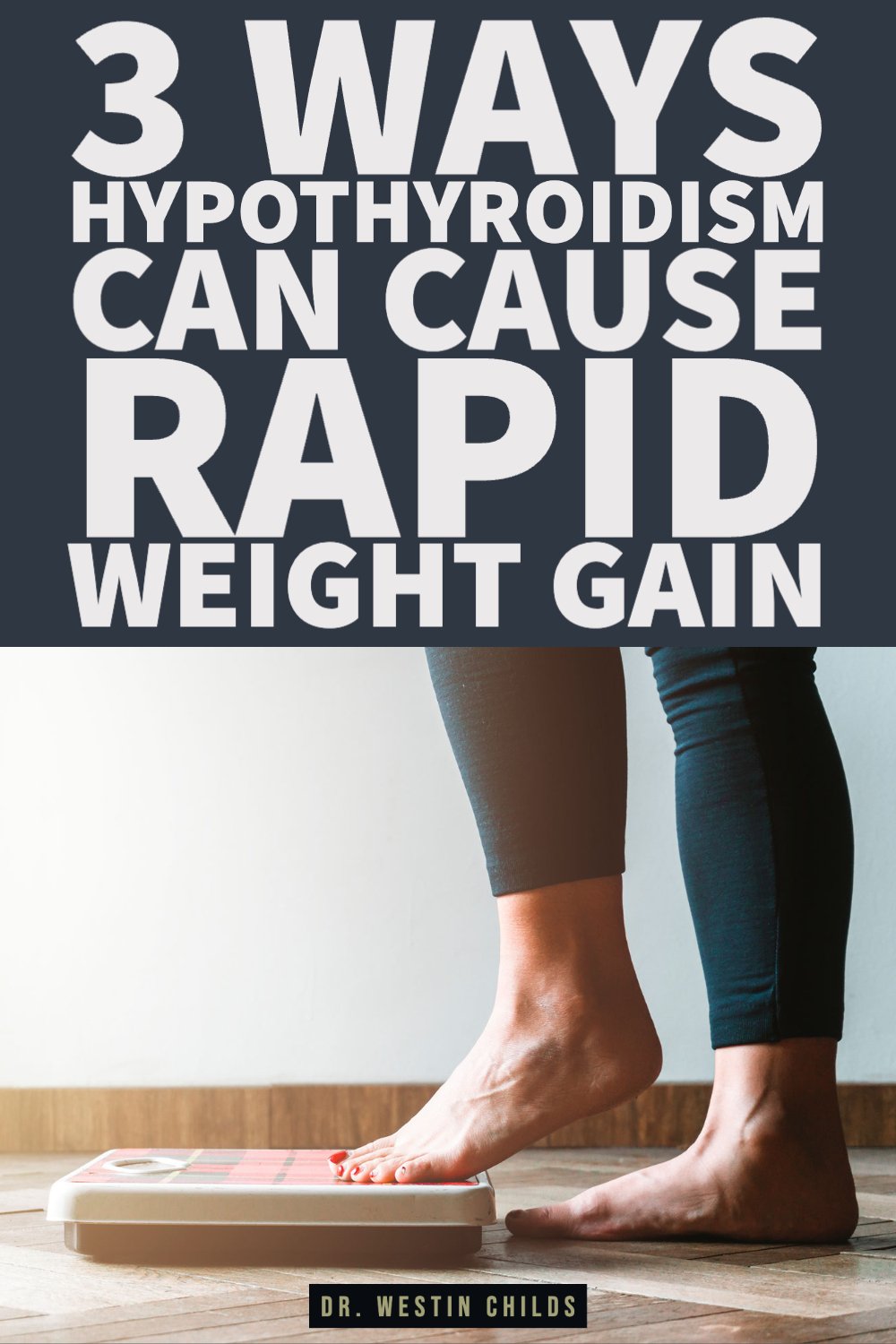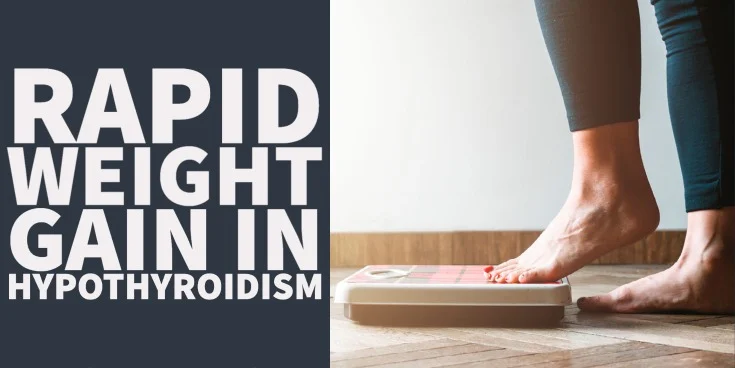Does it feel like you can rapidly gain or lose 5 pounds day to day?
I’m not talking about changes to your weight that happen throughout the course of the day, this is normal.
If you weigh yourself in the morning and then again in the evening, there will be a several-pound difference.
But what isn’t normal is to see a 5 pounds change on the scale from one morning to the next.
This indicates there’s a big problem.
And it’s a big problem that just so happens to affect many patients with hypothyroidism.
When this sort of rapid weight happens, it’s easy to just automatically assume that it’s fat.
But that’s rarely the case.
Rapid weight gain is almost always a problem related to fluid, water shifts, or changes in water weight in some form or fashion.
This is because it’s hard to truly pack on 5 pounds of fat in a single day.
In order to do this, you’d need to have a serious problem with your hormones.
The kind of problem that only occurs in rare medical conditions.
But that doesn’t mean that the type of rapid weight gain you’re experiencing isn’t a problem and shouldn’t be dealt with.
In order to figure out how to fix the problem, though, you need to understand what causes it.
And you also need to understand the difference between normal weight gain in hypothyroidism and the rapid types of weight gain we are about to discuss.
DOWNLOAD FREE RESOURCES
Foods to Avoid if you Have Thyroid Problems:
I’ve found that these 10 foods cause the most problems for thyroid patients. Learn which foods you should avoid if you have thyroid disease of any type.
The Complete List of Thyroid Lab tests:
The list includes optimal ranges, normal ranges, and the complete list of tests you need to diagnose and manage thyroid disease correctly!
Normal Weight Gain vs Abnormal Weight Gain in Hypothyroidism
Does hypothyroidism normally cause weight gain?
Absolutely.
It doesn’t have to, but it definitely does in many people (for reasons explained here).
Many (most) patients who are diagnosed with a sluggish thyroid can expect to gain anywhere between 10-15 pounds directly from their thyroid condition.
This occurs because thyroid hormones control and regulate metabolism.
As thyroid hormone levels fall so will your metabolism and you will gain some weight.
This weight gain will be a true increase in fat mass and tends to occur slowly and evenly across the entire body.
What can be confusing is the fact that some thyroid patients gain a lot more than 10-15 pounds.
And while this extra weight gain is related to their thyroid problem, it’s not directly responsible for it.
This extra weight tends to come from the issues we are about to discuss.
And it is these issues that can cause your weight to fluctuate rapidly from day to day.
Rapid Weight Gain Causes:
#1. Swelling, Edema, and Water Weight
As I mentioned earlier, if you are rapidly gaining weight you should always look at your fluid levels first.
Fluid levels refer to the amount of water that is being stored in your body at any given time.
And, believe it or not, this can fluctuate significantly from day to day based on variables like your salt intake, your hormone levels, and even your carbohydrate intake.
Here’s how your body handles fluid if you don’t have a thyroid problem:
The fluid that you get from foods and beverages makes it into your intestinal tract where they are either absorbed or kept to soften the stool.
From your intestines, this fluid makes it into your bloodstream where it heads to all of the cells and tissues that need it before making it to your kidneys where any extra is eliminated as urine.
There are many places where things can go wrong resulting in fluid accumulation and extra weight gain.
And for thyroid patients, they are extremely susceptible to edema because of a condition known as myxedema (1).
Myxedema is a condition in which glycosaminoglycans and hyaluronic acid accumulate in the skin and tissues.
These compounds can hold many multiples of their weight in water so wherever they go, water and fluid will follow.
True and full-blown myxedema is rare and is thought to only occur in severe cases of hypothyroidism, but it’s very likely that a less severe and more subtle form of myxedema occurs in many thyroid patients.
And because water is so heavy, even mild cases of edema can result in big changes on the scale.
Edema can occur all over the body and in just about any tissue, but when your thyroid is responsible it tends to accumulate in specific areas.
One of those is in the face, especially around the eyes.
This is known as periorbital edema (2) and it’s a problem that roughly 22% (or about 1 in 5) of patients with hypothyroidism will experience.
You’ve probably experienced this issue yourself if you’ve ever woken up with swelling around the eyes and face.
Fortunately, this swelling tends to subside as you wake up and as gravity pulls the extra fluid from your face back into circulation where your body can eliminate it.
On top of periorbital edema, approximately 55% of patients with hypothyroidism will experience another type of edema known as peripheral edema (3).
In peripheral edema, the swelling is localized to the legs.
But this type of edema is a little more problematic than swelling in the face for a few reasons:
The first is that there’s a lot more tissue down there which means a lot more fluid can be held in your legs.

And the second is that it’s a lot easier to miss subtle swelling in the legs than in the face.
You’re always looking at your face but how often are you examining your legs?
Probably not as much.
For this reason, peripheral edema accounts for more weight gain than that of periorbital edema and it’s the condition you should look for first if you see big changes in the scale.
How can you get rid of this extra water?
By optimizing your thyroid.
The single best way to help your body mobilize this extra fluid and to pee it out is by increasing how well your thyroid functions.
But other things like exercise, massage, compression stockings, being active, taking certain supplements, and adjusting your electrolyte intake can all help.
Not all cases of edema are from the thyroid, though, so if you have edema you always want to get checked out to make sure you aren’t missing a more serious issue.
Edema isn’t the only condition that can cause rapid weight gain which is why we need to talk about gut health next…
#2. Constipation
If you start to see the scale going up by several pounds each day, the first thing you should do after checking for swelling is ask yourself when you last had a bowel movement.
It’s not pretty, but your bowels can hold not only a lot of food but also a lot of water in the form of stool.
And stool volume can play a big role in how much you weigh day to day, especially if you are not eliminating it on a regular basis.
This is a big problem for thyroid patients because one of the most common symptoms of hypothyroidism is constipation (4).
When thyroid hormone is low, your gut will slow down which means you will have fewer bowel movements.
This problem can get so severe that some thyroid patients only experience a bowel movement once every 4 to 7 days.
Obviously, if you have 4 days worth of food in your gut, you’re not only going to see changes on the scale, but you will also feel incredibly bloated.
The actual weight of stool varies based on consistency and food intake, but one bowel movement can weigh anywhere from ¼ of a pound to 1 pound.
It seems that weighing stool isn’t an exact science, though, because many people who suffer from chronic constipation will say that they can easily gain 5-10 pounds in a week if they don’t have a bowel movement.
The volume of food that you are eating and the type of food that you are eating will also play a role here, so keep that in mind as well.
While being constipated is never fun, it’s not something you have to deal with forever.
Chronic constipation in hypothyroidism can be treated by optimizing thyroid function and by improving gut health.
Adjusting your thyroid medication, eating more fiber from fruits and vegetables, and drinking plenty of water can help you have more regular bowel movements.
Your goal should be to have at least 1 bowel movement per day, and anything less than this represents a problem and should be evaluated.
#3. Menstrual Irregularities (Hormone-Related Weight Gain)
This one only applies to women but because women get thyroid disease at a rate of about 6-8x more than men, it’s very important!
It’s fairly normal for women to gain weight during their menstrual cycle with the average being around 3 to 5 pounds.
But this number can go much higher, especially if there are imbalances in progesterone and estrogen.
In fact, some women report that they gain anywhere from 5 to 15 pounds the week of their period.
The weight gain that women experience during their menstrual cycle is, once again, related to fluid shifts.
The hormones progesterone and estrogen play an important and opposing role in managing fluid levels (5).
Estrogen causes women to retain fluid and progesterone causes women to shed extra fluid.
When balanced, this system works well and no extra fluid is retained.
But when there is a relative imbalance in estrogen and progesterone, you can see big changes in weight gain that persist after the cycle is completed.
And hypothyroidism is known to interfere with not only the menstrual cycle but also the hormones that govern this cycle.
It’s estimated that about 20% of women with hypothyroidism experience irregular menstrual cycles (either heavy cycles or infrequent cycles).
This is because of the impact that thyroid hormone has on progesterone levels (6).
In the hypothyroid state, progesterone levels are lower than normal which means estrogen can act uninhibited.
The result? More weight gain from fluid throughout the menstrual cycle.
You can easily differentiate menstrual-related fluid retention from standard edema because of how and when it occurs.
If your weight gain is cyclical and if it occurs during your period then it’s very likely related to the impact that thyroid hormone has on your sex hormones.
Once again, this problem can be fixed by optimizing your thyroid hormone levels which will then act to balance your progesterone-to-estrogen ratio.
If you think your weight gain from your thyroid is more related to an increase in fat mass as opposed to fluid, then you’ll want to check out this article next.
It walks you through some of the most common mistakes that thyroid patients make when trying to lose weight.
Now I want to hear from you:
Are you someone who rapidly gains or loses up to 5 pounds in a single day?
Do you attribute these shifts in your weight to your thyroid? Or do you think it’s related to something else?
Do you suffer from swelling or constipation related to your thyroid?
Are these two things contributing to your current weight?
Leave your questions or comments below!
Scientific References
#1. ncbi.nlm.nih.gov/books/NBK545193/
#2. ncbi.nlm.nih.gov/pmc/articles/PMC9354917/
#3. ncbi.nlm.nih.gov/books/NBK554452/
#4. pubmed.ncbi.nlm.nih.gov/6706068/
#5. ncbi.nlm.nih.gov/pmc/articles/PMC8551666/
#6. ncbi.nlm.nih.gov/pmc/articles/PMC5980701/









